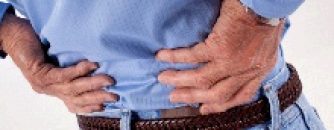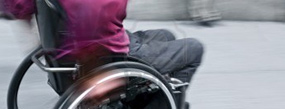Back problems are not only extremely painful, but also disruptive to your daily life. Severe back pain can take its toll on even the strongest of us, and a herniated disc is the leader of the back pain pack. Back pain is more common than you might think, in fact, it is one of the leading causes of disability suits in the US. Have a physician should look at herniated discs sooner than later, to help alleviate the back pain and get you back to your daily routine.
What is a Herniated Disc?
 A herniated disc is any disc in the spine that is ruptured or damaged in any way. The spine is made up of vertebrae, and in between each vertebra is a soft, flexible disc that absorbs any shock that the spine may encounter and keeps the spine flexible. If any of these discs become bulged or broken, they are referred to as herniated.
A herniated disc is any disc in the spine that is ruptured or damaged in any way. The spine is made up of vertebrae, and in between each vertebra is a soft, flexible disc that absorbs any shock that the spine may encounter and keeps the spine flexible. If any of these discs become bulged or broken, they are referred to as herniated.
A herniated disc can happen anywhere in the spine. While herniated discs are most common in the lower back, they can also occur in the neck, and very rarely in the upper back. Wherever a herniated disc occurs, one fact is common denominator: there will be pain, and the patient should see a doctor as soon as possible for treatment options.
What Causes a Herniated Disc?
There are a few known causes of herniated discs that include:
- Daily wear on discs—The discs that cushion our vertebrae dry out as we age, and daily wear and tear on these discs can easily lead to herniation.
- Spinal injury—Injury to the spine can cause the discs’ outer casing to crack or break, which, in turn, cause the gel inside to push its way through the cracks. This pressure causes the disc to bulge or break open, leading to herniation.
The use of proper lifting techniques, sitting in neutral positions, and the use of good posture while standing, sitting, and walking can all help to avoid the pain and inconvenience of a herniated disc. While herniated discs cannot always be prevented, these precautions will most certainly help keep discs as healthy as possible.
What Can You do for a Herniated Disc?
Some common treatments for herniated discs include:
- Rest—If you are in severe pain due to a herniated disc, rest is suggested and required to aid in the healing process. (However, too much rest can weaken the muscles surrounding the disc and can actually make your symptoms worse. If your pain is not severe, light activity will help more than you think.)
- Heat—Using a heating pad on a medium setting for 15 to 20 minutes every two or three hours will help to alleviate the pain of a herniated disc. Single-use heat wraps and warm showers can also help ease the pain.
- Exercise—There are some exercises that can be prescribed by a doctor or physical therapist to help with the pain of a herniated disc.
- Medication—A doctor can prescribe medication to help alleviate the pain of a herniated disc, but there are no medications that are a known cure.
If you’ve injured your back at your workplace, talk to an experienced workers’ compensation attorney to find out if you qualify for a claim.





